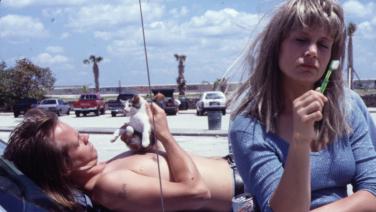
River of Grass, Kelly Reichardt, EUA, 1994, 75'
Beginning of Kelly Reichardt's retrospective. On the screen are all the components of a road movie with an existentialist spirit: Cozy is a young woman born in Miami that lives a life she finds unsatisfying. Abandoned by her mother when she was 10 years old, she is the daughter of a police inspector named Ryder, married to Boby, the mother of two sons, and finds herself in a constant vital unease about her place in the world. That is because her world is reduced to a house on the outskirts of Florida, between infinite highways, hourly-rate motels with pools, and doubts about her destiny: “Where will all these roads go?”, Cozy asks as she observes the highways that surround her life.
On the screen are all of the components for a runaway film with an American indie spirit and touches of absurd humour: Ryder is a police officer whose main characteristic is the great ease with which he constantly loses his state-issued gun. And this gun gets into the wrong hands. That is when we meet Lee, another young person about to turn thirty, wandering about in his blue Cadillac from one place to another along the coast.
We now have all of the elements for a film about youth and escape: the car, the gun, the lovers, and a police officer on the trail of a crime.
This is Director Kelly Reichardt’s first full-length feature film and the first surprise of her film catalogue, because the freedom with which she handles all plot elements is surprising. It is at once a film that seems like many others, and one that is entirely unique. If we recall the North American film tradition, we could cite two major classics: Bonnie & Clyde (Arthur Penn, 1967) and Badlands (Terrence Malick, 1973). That is the imaginary it references, albeit filtered through the young Reichardt’s particular rhythm and tone. It is as if we were before a post-rock indie version of a classic jazz-soul theme. In this sense, the most direct and intimate reference would perhaps be Barbara Loden’s Wanda (1970), a film of robberies and escape that transforms into a portrait of a woman disenchanted with the world. Here too, the characters and situations are transformed as the plot unfolds, until they are finally revealed to be a biography of their lead character, Cozy.
Like her characters, Reichardt wonders from one reference to another until fulfilling a unique purpose: very free, humanist, full of life, with touches of drama and comedy, sounding like an underground record from the 1990s. It is one of those road films that sings of endless journeys and loves lost.
On the screen are all the components of a road movie with an existentialist spirit: Cozy is a young woman born in Miami that lives a life she finds unsatisfying.
